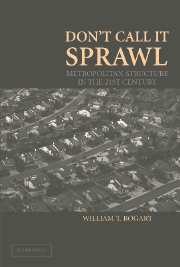Book contents
- Frontmatter
- Contents
- Acknowledgments
- 1 The World of Today
- 2 Making Things Better: The Importance of Flexibility
- 3 Are We There Yet?
- 4 Trading Places
- 5 Downtown: A Place to Work, a Place to Visit, a Place to Live
- 6 How Zoning Matters
- 7 Love the Density, Hate the Congestion
- 8 Homogeneity and Heterogeneity in Local Government
- 9 The World of Tomorrow
- Notes
- References
- Index
4 - Trading Places
Published online by Cambridge University Press: 02 December 2009
- Frontmatter
- Contents
- Acknowledgments
- 1 The World of Today
- 2 Making Things Better: The Importance of Flexibility
- 3 Are We There Yet?
- 4 Trading Places
- 5 Downtown: A Place to Work, a Place to Visit, a Place to Live
- 6 How Zoning Matters
- 7 Love the Density, Hate the Congestion
- 8 Homogeneity and Heterogeneity in Local Government
- 9 The World of Tomorrow
- Notes
- References
- Index
Summary
We are caught in the tension between forces that encourage distinctiveness and forces that compel all communities toward identicality. Centrifugal forces broke down the huge ancient cities, the Londons and Tokyos and New Yorks, into neighborhood communities that seized quasi-autonomous powers. Those giant cities were too unwieldy to survive; density of population, making long-distance transport unfeasible and communication difficult, shattered the urban fabric, destroyed the authority of the central government, and left the closely knit small-scale subcity as the only viable unit. Two dynamic and contradictory processes now asserted themselves. Pride and the quest for local advantage led each community toward specialization: this one a center primarily of industrial production, this one devoted to advanced education, this to finance, this to the processing of raw materials, this to wholesale marketing of commodities, this to retail distribution, and so on, the shape and texture of each district defined by its chosen function. And yet the new decentralization required a high degree of redundancy, duplication of governmental structures, of utilities, of community services; for its own safety each district felt the need to transform itself into a microcosm of the former full city. Ideally we should have hovered in perfect balance between specialization and redundancy, all communities striving to fulfill the needs of all other communities with the least possible overlap and waste of resources; in fact our human frailty has brought into being these irreversible trends of rivalry and irrational fear, dividing district from district, so that against our own self-interest we sever year after year our bonds of interdependence and stubbornly seek self-sufficiency at the district level.[…]
- Type
- Chapter
- Information
- Don't Call It SprawlMetropolitan Structure in the 21st Century, pp. 64 - 88Publisher: Cambridge University PressPrint publication year: 2006



